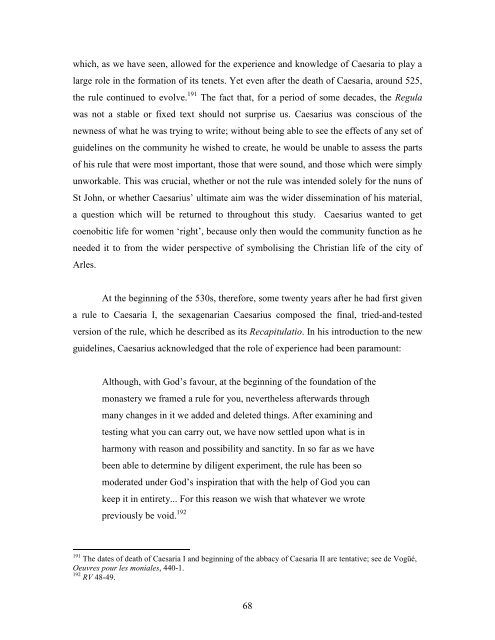Lindsay Rudge PhD Thesis - University of St Andrews
Lindsay Rudge PhD Thesis - University of St Andrews
Lindsay Rudge PhD Thesis - University of St Andrews
Create successful ePaper yourself
Turn your PDF publications into a flip-book with our unique Google optimized e-Paper software.
which, as we have seen, allowed for the experience and knowledge <strong>of</strong> Caesaria to play a<br />
large role in the formation <strong>of</strong> its tenets. Yet even after the death <strong>of</strong> Caesaria, around 525,<br />
the rule continued to evolve. 191 The fact that, for a period <strong>of</strong> some decades, the Regula<br />
was not a stable or fixed text should not surprise us. Caesarius was conscious <strong>of</strong> the<br />
newness <strong>of</strong> what he was trying to write; without being able to see the effects <strong>of</strong> any set <strong>of</strong><br />
guidelines on the community he wished to create, he would be unable to assess the parts<br />
<strong>of</strong> his rule that were most important, those that were sound, and those which were simply<br />
unworkable. This was crucial, whether or not the rule was intended solely for the nuns <strong>of</strong><br />
<strong>St</strong> John, or whether Caesarius’ ultimate aim was the wider dissemination <strong>of</strong> his material,<br />
a question which will be returned to throughout this study. Caesarius wanted to get<br />
coenobitic life for women ‘right’, because only then would the community function as he<br />
needed it to from the wider perspective <strong>of</strong> symbolising the Christian life <strong>of</strong> the city <strong>of</strong><br />
Arles.<br />
At the beginning <strong>of</strong> the 530s, therefore, some twenty years after he had first given<br />
a rule to Caesaria I, the sexagenarian Caesarius composed the final, tried-and-tested<br />
version <strong>of</strong> the rule, which he described as its Recapitulatio. In his introduction to the new<br />
guidelines, Caesarius acknowledged that the role <strong>of</strong> experience had been paramount:<br />
Although, with God’s favour, at the beginning <strong>of</strong> the foundation <strong>of</strong> the<br />
monastery we framed a rule for you, nevertheless afterwards through<br />
many changes in it we added and deleted things. After examining and<br />
testing what you can carry out, we have now settled upon what is in<br />
harmony with reason and possibility and sanctity. In so far as we have<br />
been able to determine by diligent experiment, the rule has been so<br />
moderated under God’s inspiration that with the help <strong>of</strong> God you can<br />
keep it in entirety... For this reason we wish that whatever we wrote<br />
previously be void. 192<br />
191 The dates <strong>of</strong> death <strong>of</strong> Caesaria I and beginning <strong>of</strong> the abbacy <strong>of</strong> Caesaria II are tentative; see de Vogüé,<br />
Oeuvres pour les moniales, 440-1.<br />
192 RV 48-49.<br />
68

















